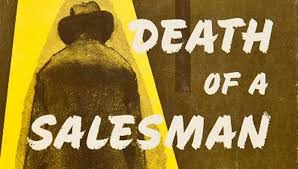The first time I saw Arthur Miller’s ’Death of a Salesman’; I came to the conclusion that being in sales would be hell. It is still a mystery to me why I ended up, years later and against all my best intentions, in a sales role. Maybe it was because I got a company car and every day was a new adventure, or maybe it was because I love problem solving and helping people, or maybe it was the adrenalin rush when a customer said ‘yes’.
No one is born a salesperson
I was everything but a natural at sales. In fact, as a bit of an introvert, I was surprised that Sales was the one role I got hired and headhunted for again and again and again. Destiny? So, it seems. However, the point of the story is that I had to learn sales. The hard way.
I sold photocopiers door to door (yes, showing my age), building resilience as countless doors were slammed in my face. Over time I learned the art and science of sales and got better at my job. I realised that “sales was not sales”. To succeed, the approach to sales needed to be agile, changing all the time to keep up with evolving markets, changing decision making processes, different buyer behaviors and moving competitive landscapes. When I left the IBM sales floor 16 years ago to start my consulting business, I started to see repeating patterns across more than 100 businesses.
Sales Talk is over
Everything about sales has seemingly changed. I see regular news feeds that say the digital information age has made the sales person redundant. The ‘talking brochures’ are finally obsolete. They earn too much, lunch too much and don’t know enough about their stuff.
It is true that prior to the Internet, Customers were reliant on sales people to inform their decisions. Now, with the amount of information available, a sales approach talking about feature, function and benefit is not working any more. Customers engage vendors later in the buying cycle and they want to deal with consultative sales people they can trust, have a deep understanding of their business and a lot of subject matter expertise.
So, is Sales dead?
No. Never. The trust of a potential customer going through the agonies of a buying cycle is built through human interaction at many different psychological levels. The higher the risk of a decision, the higher the need for an authentic, trusted relationship with an organisation and the individuals representing it. It is not possible to build a human-to-human relationship at that level through email or a landing page.
Long live Sales – overcoming today’s sales challenges
The biggest challenges for most B2B Leaders in growing their business, is building and maintaining an effective sales team:
- 71% of companies take 6 months or longer to onboard new sales reps; a third of all companies take 9 months or more (Forbes, 2016)
- A 20- 34% annual turnover of sales people means only about 1 in 4 new sales hires deliver (Bridge Group, 2015)
- On average only 57% make quota (Forbes, 2018)
- Only 39% of a sales rep’s timeis spent selling or interacting with prospects and customers (Seismic, 2019)
Given the high packages B2B Sales People demand, getting a new hire wrong can easily cost in excess of $300K and damage a business at many different levels.
Today, it is true that the times relying on selling skills to grow a business are well and truly over.
What this means is, that businesses need to manage sales as a process that is robust, teachable and scalable so they can drain away the dependency on an individual’s skills.
This process contains 6 must-have components:
- Sales Model: How do you reach and connect with a target market?
- Sales Plan: Breaking down where your revenue will come from?
- Sales Structure: What will your team org chart look like?
- Sales Process: What are the steps, what do you do and how do you do it?
- Sales Campaigns: How will marketing activities support sales targets?
- Sales Management: How does the most pivotal role keep performance up?
There is certainly a linear planning aspect across these components, yet they are also interwoven. I see so often the reach for a short term fix such as short- term sales training, hiring & firing, or disjointed marketing campaigns to solve the problem. It is almost a law of nature that any one of these remedies can’t really succeed in isolation.
And here is the hard part: it is not possible to learn the theory of sales at a business management school and simply apply it. It is still largely based on long term experience in the world of sales. There are many moving parts, and the overall context of the market a business operates in needs to be considered.
About Business Backstage:
Ursula Dauenhauer, Founder of Business Backstage, is passionate about helping medium sized B2B companies to accelerate business growth. For over 15 years now, Ursula has helped business leaders to have confidence in the sales pipelines, build a scalable sales structure and get the Sales Mojo. For a conversation over a cup of coffee you can phone Ursula on 0401 147 493 or email ursula@gotomarketconsulting.com.au.

